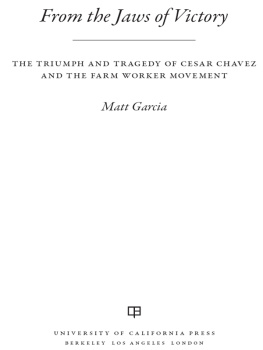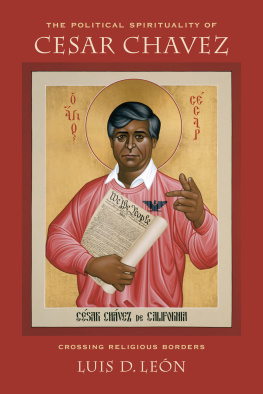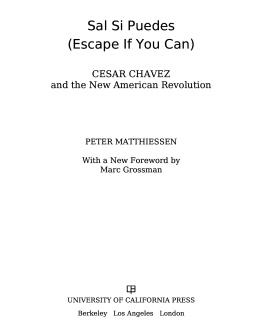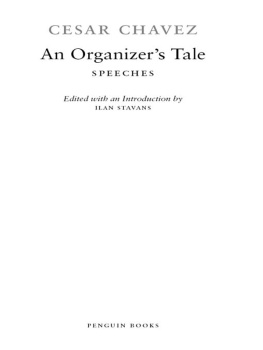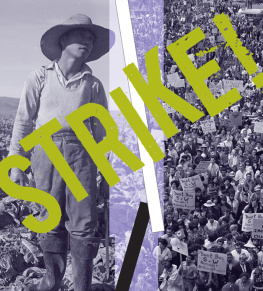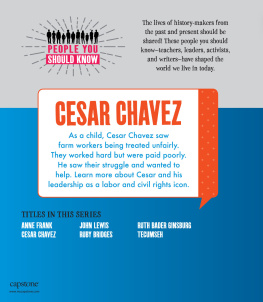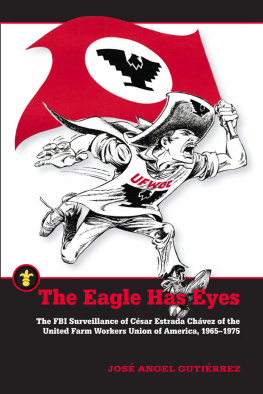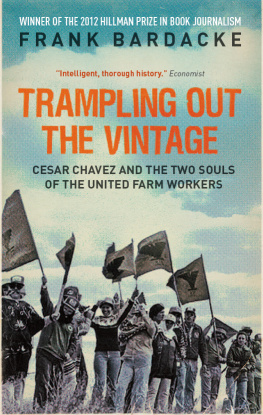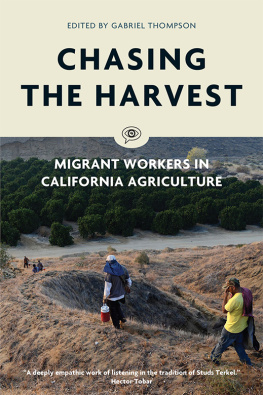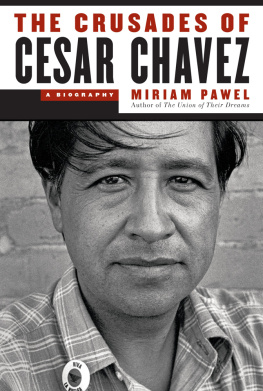
Trampling Out
the Vintage
CESAR CHAVEZ AND THE TWO SOULS
OF THE UNITED FARM WORKERS
Frank Bardacke

The best workplace study of labour in North America published in a generation... No history of California, no history of Mexican-American life and no history of agricultural production can be written again without the insights contained in these pages.
Paul Buhle, New Left Review
Bardacke is a talented writer, burning with rage against injustice, and his subject is one of the most attractive and charismatic figures U.S. politics has produced.
Francis Beckett, Guardian
The first comprehensive history of the rise and fall of the UFW, written from the viewpoint of the farmworkers who vitalized the movement known as La Causa.
San Francisco Chronicle
Superb.
Mother Jones
In the era of so many book-a-year authors, Trampling Out the Vintage has a lifetime-achievement feel. It skillfully tells the dramatic story of the rise and fall of the UFW, but what makes this a landmark book is its emphasis on the rank-and-file leaders, who are too often obscured by the long shadow cast by Chavez. It is these workers who are the heroes of Bardackes bookworkers whose leadership was essential to the unions success, and whose betrayal contributed to its eventual demise.
Nation
Theres so much marvelous stuff in Frank Bardackes book thats simply not been done before. At the books core are the men and women who pick the crops in Californias fields and orchards, their skill and endurance, the world they built among themselves, the ways they shaped the history of the UFW. It is their storyrefreshingly, sympathetically, and beautifully toldthat makes this book stand apart and will make it stand forever.
Alexander Cockburn, coauthor of Whiteout: The CIA, Drugs and the Press
Magnificent and tragic history... Bardackes enormously insightful and nuanced book thus radically reconfigures the social, political, and moral narrative with which most Americans have understood the history of the farm worker movement and its leadership.
Nelson Lichtenstein, Dissent
You can take little sections out of the book and theyre the best thing ever written on the subject.
Harold Meyerson, Editor-at-Large at the American Prospect and Hillman Prize judge
Frank Bardackes long-awaited masterpiece is the kind of book that comes along only once in a generation, if were lucky. Not only is the research spectacular and his analysis of the United Farm Workers as a social movement nuanced and compelling, but he finally places rank-and-file farm workers at the center of the story as savvy and opinionated activists. Best of all, hes a superb writer whos constructed a gripping tale.
Dana Frank, Professor of History at the University of California, Santa Cruz
It is the human beings that come alive hereunion officials, organizers and workerswith their foibles, rivalries, and triumphs. Cesar Chavez emerges as a hugely complex individual with a full range of all too human traits. An extraordinary book about an extraordinary movement and man, and a story as inspiring as it is tragic.
Douglas Monroy, author of The Borders Within: Encounters between Mexico and the US
An expansive, readable study of one of the more meaningful struggles of the twentieth century and an instruction book for anyone interested in organizing workers to regain the wealth that they create.
International Socialist Review
The best history ever written of the United Farm Workers and Cesar Chavez. Certain to become a classic of U.S. working-class history.
Upside Down World

A celery crew at work, Pajaro Valley, 1982. Photo by Fred Chamberlain.
The comprehensive history of the United Farm Workers, a definitive biography of Cesar Chavez and a magnificent guide to the politics and sociology of the 1960s80s.
Daily Censored
Bardacke is a top investigative reporter with a refreshing clarity of style who employs the careful documentation of a trained historian.
Salinas Californian
The most complete account yet of the rise and fall of the UFW. It is also an epic, Shakespearean drama with all of the elements of a Hollywood blockbuster. Bardacke masters an enormous amount of material to relate these events skillfully. He salts his prose with stories and characters straight out of Steinbeck.
Jam Side Down
The first book Ive read in years that lives up to every pre-release superlative applied to it... The kind of true history that reads like a great novel.
Anderson Valley Advertiser
There is much to learn about, to grieve, and to celebrate in this opus.
California Teacher
For Cleofas Guzman,
and with love and thanks to
Julie Miller
O what a fall was there, my countrymen! Then I, and you, and all of us fell down...
Julius Cesar , Act III, scene ii
Contents
PROLOGUE
The Car Pool
Most California farm workers do not ride to work alone. They travel in company buses and vans, or squeeze together in private cars with other workers, who often are also their relatives or lifelong friends. For three-quarters of a century, people have been driving their cars up and down and across the Golden State looking for work. Caravans of carsperhaps the most essential agricultural implements in Californialoved and hated by mechanically skilled Joads of all nationalities, who intimately knew the carburetors and fuel pumps and transmissions of the Studebakers, Fords, and Chevys, and now struggle with the injection systems of the popular Toyotas that may also be their homes, death beds, and birth beds. Cars are so vital to the internal relations of farm workers that the Farm Placement Service, faithful servant of California agribusiness, had as one of its policies in the 1950s and 60s to break up car pools and disperse their members to separate farms, as the bosses knew from bitter experience that the bonds of solidarity built from traveling and living together often spilled over onto the job.
Pablo Camacho remembers every car. In his first car pool, from 1961 to 1967, we started with my 49 Ford; next we got a 55 Ford, but after that it was all Chevys. In 1977 and 1978, Camacho drove two identical 1969 Impalas, and I was in his car pool. We were part of a crew that cut and packed celery for InterHarvest in the Salinas Valley, a region made famous by the travails of some of Steinbecks protagonists, and still one of the most productive agricultural areas in the world. Those were the high daysamong the last high days, as it turned outof the United Farm Workers. Just a little more than ten years earlier the union had been born, improbably, in a grape strike in a dusty town in Californias Central Valley, and, decisively, amid a mass movement in America that, for a very brief time, made everything seem possible. By 1968, Cesar Chavez was being hailed as a hero in a country quickly running out of them, and the union was making its name outside the fields with the most powerful boycott in U.S. history. In Salinas, where the union was most successful in the fields for the longest time, and where farm workers wages were the highest, piece-rate vegetable workers such as Camacho formed the core strength of the United Farm Workers union (UFW).
We worked on one of the several dozen piece-rate vegetable crews in the valley. Piece-rate crews are paid collectively. Each member gets an equal share of the price the company pays for each box or bin of lettuce or celery or broccoli. Those were the three main crops harvested by piece-rate crews when I worked in the fields; other crops were harvested by the hour, by individual piece rate, or by machines. At InterHarvest we were paid about $1.40 for each box of celery we cut and packed, which we split thirty-eight ways. It worked out to about $12 an hour, more than $48 dollars in todays money. The four loaders were paid separately, and they made even more. Positions on these crews were greatly prized in farm worker communities, and the workers were highly skilled, tightly organized, and deeply loyal to the UFW. They were hard to replace during strikes except with similarly skilled workers, and in nonstrike periods they wielded their power through slowdowns, work stoppages, and mild forms of sabotage.
Next page

